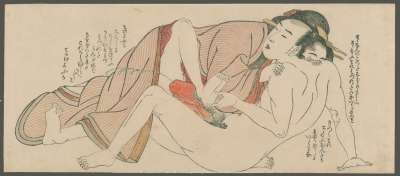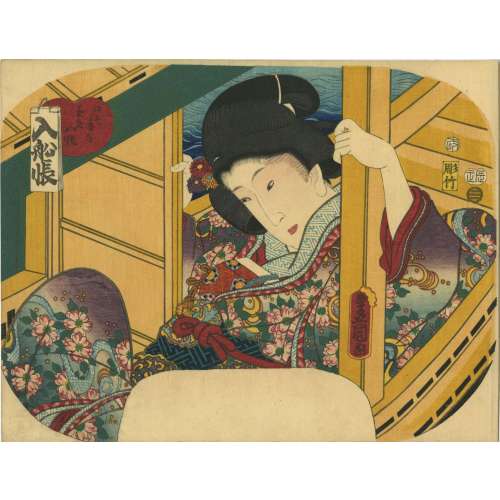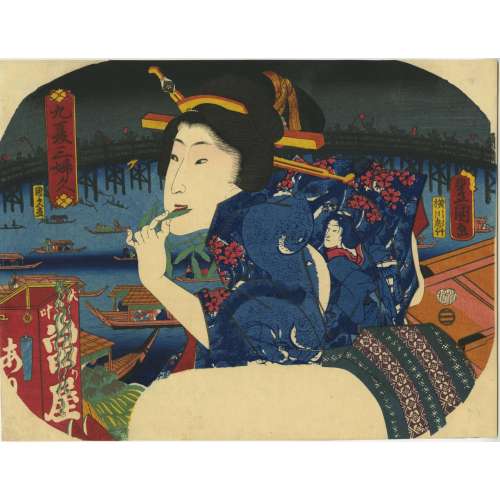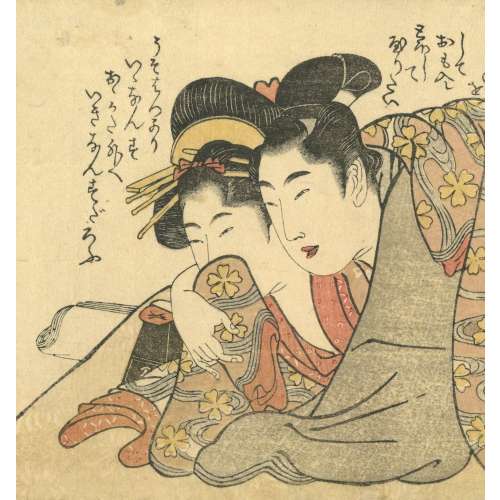Artist: Kitagawa Utamaro [喜多川 歌麿] (Japanese, c. 1753 – 1806)
"This uncommon half-size horizontal ōban ... is most likely one design from a set of twelve prints issued late in Utamaro's life" [
Japanese Erotic Fantasies, Hotei Publishing, 2005, p. 143, pl. 47]. Half-size horizontal
ōban must be 12.7 x 38 cm. Richard Waldman and Chris Uhlenbeck say it's
tanzaku size (13 x 43 cm). In reality, the prints of this series measure 17 x 38 cm, which corresponds exactly to horizontal
o-hosoban paper size.
I managed to assemble 11 of allegedly 12 designs. 7 of them have genitals colored by hand. It's hard to tell whether it was done by the publisher on demand of a peculiar buyer, or by the owner of the prints who considered the black and white privy parts unnatural.
My sequencing of the prints is arbitrary. Transcription of the text may help find the correct order.

As
Japanese Erotic Fantasies put it: "a couple engaged in love-making, their stare fixed outside the picture plane". This is the only image of series that has a reference in available western literature, and the only one found in museum collections: Rijksmuseum Amsterdam (RP-P-1999-2001-16); reference: Fukuda (ed.) (1990), pls. 11-2.

The scene of this print looks quite similar to that of the Kiyonaga's Sode no maki:

The woman is "a young lady-in-waiting of Shogun's Court or Daimyō's Mansion, enjoying a rare outing from her tedious chores" [Richard Lane]. She is fully dressed in her outer cloak (
shikake), white paper hat (
agebōshi or
tsunokakushi), and toed socks (tabi). A book or maybe,
onkotogami (roll of tissues known as 'paper for honourable act' ) is still in the folds of her kimono. She is holding an open fan, either to cover her and her lover's faces from an unsolicited witness or to bring some fresh air to their joined lips. The pair just started their sexual intercourse.

A scene from medieval times. A courtier in
eboshi cap having sex with an aristocratic young woman with a long straight hairstyle (
suihatsu).

Completely naked couple in the moment of ejaculation. Lavish garments with paulownia leaves on a yellow background counterbalance the white bodies on red bedding. The form of a woman's cheeks is telling, but I don't know about what. Maybe her advanced age?

The pose of the couple and the overall composition are similar to that of the previous sheet. Though the lovers are dressed, and the woman's hairdo is well kept. The male looks older and the woman - younger.

A man takes a young maid from behind. She clenches the sleeve of her kimono in her teeth; it's either the moment of penetration (beginning of intercourse) or of her orgasm (the end of it).

This seems to be a forced intercourse between a lackey with extensive bodily hair and a young maid from the same household.

This design is very much like the other one presented below, which is described at Japanese Erotic Fantasies on page 136 (pl. 43b) as follows: "The viewer peers through a mosquito net to see a child fast asleep, while his mother or wet-nurse moves towards her partner. On our print there is no child; instead of a sleeping baby, there is a roll of
onkotogami. Fewer objects make the overall image concise, almost laconic in comparison with the
Ehon hana fubuki (1802) design:


A young couple in a moment of true love. He is listening to the beating of her heart.

This is a moment of true love between an old monk and a young samurai. The latter even did not take of his socks (tabi).

From
Japanese Erotic Fantasies: "Boats played a crucial role in the workings of Yoshiwara, as they were the primary means of transport to the district. During the hot summer months, trips on pleasure boats were also a favourite pastime. Sex aboard a boat is a recurrent theme in shunga".
The last print that I am currently lacking and hunting for:

I know where it is, but I cannot reach it... yet.
 Artist: Utagawa Kunisada [歌川 国貞] a.k.a. Utagawa Toyokuni III [三代歌川豊国] (Japanese, 1786 – 1865). Block cutter: Yokokawa Takejirō [横川竹二郎] (Japanese, fl. 1845 – 1863), seal Hori Take [彫竹]. Publisher: Ibaya Senzaburō [伊場屋仙三郎] (Japanese, fl. C. 1845 – 1847). Title: Book of an incoming ship [入船帳] (Irifune-chō). Series: Comparison of Eight Books of Proficiency and Eloquence [口も手も美立八帳] (Kuchimo temo mitate hatchō). Date seal and aratame censor seal: 1856 (Ansei 3). Signed: Toyokuni ga in toshidama cartouche. Media: Untrimmed fan print (uchiwa-e), 231 x 300 mm. Provenance: The Collection of Paul F. Walter, Christie's, New York, 2017, lot 341; sold together with 5 other fan prints for $25,000. Before: Israel Goldman, Japanese Prints, Catalogue 11, 2005, no. 37. Ref: [LIB-1693.2018] The Collection of Paul Walter. — NY: Christie's, 2017, p. 363. Ref: Israel Goldman, Catalogue 2018, № 51: "Utagawa Kunisada (1786-1865) A Beauty Seated in a Boat. From the series Mitate hatcho (A Parody of Eight Books). 1856. Fan print. 23.3 x 30 cm. Provenance: Israel Goldman, Japanese Prints, Catalogue 11, 2005, no. 37, The Collection of Paul F. Walter, Christie's, New York, 2017, lot 341. Fine impression, colour and condition. The title contains the saying: “Kuchi mo hatcho te mo hatcho (As quick with one’s hand as one’s tongue)." Special thanks to Horst Graebner for the detailed description.
Artist: Utagawa Kunisada [歌川 国貞] a.k.a. Utagawa Toyokuni III [三代歌川豊国] (Japanese, 1786 – 1865). Block cutter: Yokokawa Takejirō [横川竹二郎] (Japanese, fl. 1845 – 1863), seal Hori Take [彫竹]. Publisher: Ibaya Senzaburō [伊場屋仙三郎] (Japanese, fl. C. 1845 – 1847). Title: Book of an incoming ship [入船帳] (Irifune-chō). Series: Comparison of Eight Books of Proficiency and Eloquence [口も手も美立八帳] (Kuchimo temo mitate hatchō). Date seal and aratame censor seal: 1856 (Ansei 3). Signed: Toyokuni ga in toshidama cartouche. Media: Untrimmed fan print (uchiwa-e), 231 x 300 mm. Provenance: The Collection of Paul F. Walter, Christie's, New York, 2017, lot 341; sold together with 5 other fan prints for $25,000. Before: Israel Goldman, Japanese Prints, Catalogue 11, 2005, no. 37. Ref: [LIB-1693.2018] The Collection of Paul Walter. — NY: Christie's, 2017, p. 363. Ref: Israel Goldman, Catalogue 2018, № 51: "Utagawa Kunisada (1786-1865) A Beauty Seated in a Boat. From the series Mitate hatcho (A Parody of Eight Books). 1856. Fan print. 23.3 x 30 cm. Provenance: Israel Goldman, Japanese Prints, Catalogue 11, 2005, no. 37, The Collection of Paul F. Walter, Christie's, New York, 2017, lot 341. Fine impression, colour and condition. The title contains the saying: “Kuchi mo hatcho te mo hatcho (As quick with one’s hand as one’s tongue)." Special thanks to Horst Graebner for the detailed description. Untrimmed fan print (uchiwa-e), 231 x 300 mm. Title: A geisha eating edamame aboard the boat of the Atari-ya teahouse. Series: Three summer women [九夏三婦久] (Kyūka sanfuku). Artist: Utagawa Kunisada [歌川 国貞] a.k.a. Utagawa Toyokuni III [三代歌川豊国] (Japanese, 1786 – 1865). Artist: Utagawa Kunihisa II [歌川国久] a.k.a. Katsuda Hisatarō, Ichiunsai, Ritchōrō, Toyonobu, Yōryūsai, Yōsai] (Japanese, 1832 – 1981). Block cutter: Yokokawa Horitake [横川彫武] a.k.a. Yokokawa Takejiro [横川竹二郎] (Japanese, fl. 1860s). Publisher: Ibaya Senzaburō [伊場屋仙三郎] (Japanese, fl. C. 1845 – 1847) Combined date seal and kiwame censor seal: 1860 (Ansei 7 / Man'en 1 from 18/III). Signed: Toyokuni ga in toshidama cartouche, and Kunihisa ga. Provenance: The Collection of Paul F. Walter, Christie's, New York, 2017, lot 341; sol together with 5 other fan prints for $25,000. Before: Israel Goldman, Japanese Prints, Catalogue 9, 2003, no. 35. Ref: [LIB-1693.2018] The Collection of Paul Walter. — NY: Christie's, 2017, p. 363. Ref: Israel Goldman, Catalogue 2018, № 52: "Utagawa Kunisada (1786-1865) and Utagawa Kunihisa II (1832-1891) A Geisha Eating Edamame Aboard the Boat of the Atari-ya Teahouse. From the series Kyuka sanfuku (Three Summer Women). 1860. Fan print. 22.7 x 29.6 cm. Provenance: Israel Goldman, Japanese Prints, Catalogue 9, 2003, no. 35. The Collection of Paul F. Walter, Christies, New York, 201, lot 341. Fine impression, colour and condition. The title is a pun on “kyuka sanpuku” meaning the hottest point of the summer. The background view is by Kunisada’s pupil Kunihisa."
Untrimmed fan print (uchiwa-e), 231 x 300 mm. Title: A geisha eating edamame aboard the boat of the Atari-ya teahouse. Series: Three summer women [九夏三婦久] (Kyūka sanfuku). Artist: Utagawa Kunisada [歌川 国貞] a.k.a. Utagawa Toyokuni III [三代歌川豊国] (Japanese, 1786 – 1865). Artist: Utagawa Kunihisa II [歌川国久] a.k.a. Katsuda Hisatarō, Ichiunsai, Ritchōrō, Toyonobu, Yōryūsai, Yōsai] (Japanese, 1832 – 1981). Block cutter: Yokokawa Horitake [横川彫武] a.k.a. Yokokawa Takejiro [横川竹二郎] (Japanese, fl. 1860s). Publisher: Ibaya Senzaburō [伊場屋仙三郎] (Japanese, fl. C. 1845 – 1847) Combined date seal and kiwame censor seal: 1860 (Ansei 7 / Man'en 1 from 18/III). Signed: Toyokuni ga in toshidama cartouche, and Kunihisa ga. Provenance: The Collection of Paul F. Walter, Christie's, New York, 2017, lot 341; sol together with 5 other fan prints for $25,000. Before: Israel Goldman, Japanese Prints, Catalogue 9, 2003, no. 35. Ref: [LIB-1693.2018] The Collection of Paul Walter. — NY: Christie's, 2017, p. 363. Ref: Israel Goldman, Catalogue 2018, № 52: "Utagawa Kunisada (1786-1865) and Utagawa Kunihisa II (1832-1891) A Geisha Eating Edamame Aboard the Boat of the Atari-ya Teahouse. From the series Kyuka sanfuku (Three Summer Women). 1860. Fan print. 22.7 x 29.6 cm. Provenance: Israel Goldman, Japanese Prints, Catalogue 9, 2003, no. 35. The Collection of Paul F. Walter, Christies, New York, 201, lot 341. Fine impression, colour and condition. The title is a pun on “kyuka sanpuku” meaning the hottest point of the summer. The background view is by Kunisada’s pupil Kunihisa." Artist: Kitagawa Utamaro [喜多川 歌麿] (Japanese, c. 1753 – 1806) "This uncommon half-size horizontal ōban ... is most likely one design from a set of twelve prints issued late in Utamaro's life" [Japanese Erotic Fantasies, Hotei Publishing, 2005, p. 143, pl. 47]. Half-size horizontal ōban must be 12.7 x 38 cm. Richard Waldman and Chris Uhlenbeck say it's tanzaku size (13 x 43 cm). In reality, the prints of this series measure 17 x 38 cm, which corresponds exactly to horizontal o-hosoban paper size. I managed to assemble 11 of allegedly 12 designs. 7 of them have genitals colored by hand. It's hard to tell whether it was done by the publisher on demand of a peculiar buyer, or by the owner of the prints who considered the black and white privy parts unnatural. My sequencing of the prints is arbitrary. Transcription of the text may help find the correct order.
Artist: Kitagawa Utamaro [喜多川 歌麿] (Japanese, c. 1753 – 1806) "This uncommon half-size horizontal ōban ... is most likely one design from a set of twelve prints issued late in Utamaro's life" [Japanese Erotic Fantasies, Hotei Publishing, 2005, p. 143, pl. 47]. Half-size horizontal ōban must be 12.7 x 38 cm. Richard Waldman and Chris Uhlenbeck say it's tanzaku size (13 x 43 cm). In reality, the prints of this series measure 17 x 38 cm, which corresponds exactly to horizontal o-hosoban paper size. I managed to assemble 11 of allegedly 12 designs. 7 of them have genitals colored by hand. It's hard to tell whether it was done by the publisher on demand of a peculiar buyer, or by the owner of the prints who considered the black and white privy parts unnatural. My sequencing of the prints is arbitrary. Transcription of the text may help find the correct order. As Japanese Erotic Fantasies put it: "a couple engaged in love-making, their stare fixed outside the picture plane". This is the only image of series that has a reference in available western literature, and the only one found in museum collections: Rijksmuseum Amsterdam (RP-P-1999-2001-16); reference: Fukuda (ed.) (1990), pls. 11-2.
As Japanese Erotic Fantasies put it: "a couple engaged in love-making, their stare fixed outside the picture plane". This is the only image of series that has a reference in available western literature, and the only one found in museum collections: Rijksmuseum Amsterdam (RP-P-1999-2001-16); reference: Fukuda (ed.) (1990), pls. 11-2.
 The scene of this print looks quite similar to that of the Kiyonaga's Sode no maki:
The scene of this print looks quite similar to that of the Kiyonaga's Sode no maki:
 The woman is "a young lady-in-waiting of Shogun's Court or Daimyō's Mansion, enjoying a rare outing from her tedious chores" [Richard Lane]. She is fully dressed in her outer cloak (shikake), white paper hat (agebōshi or tsunokakushi), and toed socks (tabi). A book or maybe, onkotogami (roll of tissues known as 'paper for honourable act' ) is still in the folds of her kimono. She is holding an open fan, either to cover her and her lover's faces from an unsolicited witness or to bring some fresh air to their joined lips. The pair just started their sexual intercourse.
The woman is "a young lady-in-waiting of Shogun's Court or Daimyō's Mansion, enjoying a rare outing from her tedious chores" [Richard Lane]. She is fully dressed in her outer cloak (shikake), white paper hat (agebōshi or tsunokakushi), and toed socks (tabi). A book or maybe, onkotogami (roll of tissues known as 'paper for honourable act' ) is still in the folds of her kimono. She is holding an open fan, either to cover her and her lover's faces from an unsolicited witness or to bring some fresh air to their joined lips. The pair just started their sexual intercourse.
 A scene from medieval times. A courtier in eboshi cap having sex with an aristocratic young woman with a long straight hairstyle (suihatsu).
A scene from medieval times. A courtier in eboshi cap having sex with an aristocratic young woman with a long straight hairstyle (suihatsu).
 Completely naked couple in the moment of ejaculation. Lavish garments with paulownia leaves on a yellow background counterbalance the white bodies on red bedding. The form of a woman's cheeks is telling, but I don't know about what. Maybe her advanced age?
Completely naked couple in the moment of ejaculation. Lavish garments with paulownia leaves on a yellow background counterbalance the white bodies on red bedding. The form of a woman's cheeks is telling, but I don't know about what. Maybe her advanced age?
 The pose of the couple and the overall composition are similar to that of the previous sheet. Though the lovers are dressed, and the woman's hairdo is well kept. The male looks older and the woman - younger.
The pose of the couple and the overall composition are similar to that of the previous sheet. Though the lovers are dressed, and the woman's hairdo is well kept. The male looks older and the woman - younger.
 A man takes a young maid from behind. She clenches the sleeve of her kimono in her teeth; it's either the moment of penetration (beginning of intercourse) or of her orgasm (the end of it).
A man takes a young maid from behind. She clenches the sleeve of her kimono in her teeth; it's either the moment of penetration (beginning of intercourse) or of her orgasm (the end of it).
 This seems to be a forced intercourse between a lackey with extensive bodily hair and a young maid from the same household.
This seems to be a forced intercourse between a lackey with extensive bodily hair and a young maid from the same household.
 This design is very much like the other one presented below, which is described at Japanese Erotic Fantasies on page 136 (pl. 43b) as follows: "The viewer peers through a mosquito net to see a child fast asleep, while his mother or wet-nurse moves towards her partner. On our print there is no child; instead of a sleeping baby, there is a roll of onkotogami. Fewer objects make the overall image concise, almost laconic in comparison with the Ehon hana fubuki (1802) design:
This design is very much like the other one presented below, which is described at Japanese Erotic Fantasies on page 136 (pl. 43b) as follows: "The viewer peers through a mosquito net to see a child fast asleep, while his mother or wet-nurse moves towards her partner. On our print there is no child; instead of a sleeping baby, there is a roll of onkotogami. Fewer objects make the overall image concise, almost laconic in comparison with the Ehon hana fubuki (1802) design:

 A young couple in a moment of true love. He is listening to the beating of her heart.
A young couple in a moment of true love. He is listening to the beating of her heart.
 This is a moment of true love between an old monk and a young samurai. The latter even did not take of his socks (tabi).
This is a moment of true love between an old monk and a young samurai. The latter even did not take of his socks (tabi).
 From Japanese Erotic Fantasies: "Boats played a crucial role in the workings of Yoshiwara, as they were the primary means of transport to the district. During the hot summer months, trips on pleasure boats were also a favourite pastime. Sex aboard a boat is a recurrent theme in shunga".
The last print that I am currently lacking and hunting for:
From Japanese Erotic Fantasies: "Boats played a crucial role in the workings of Yoshiwara, as they were the primary means of transport to the district. During the hot summer months, trips on pleasure boats were also a favourite pastime. Sex aboard a boat is a recurrent theme in shunga".
The last print that I am currently lacking and hunting for:
 I know where it is, but I cannot reach it... yet.
I know where it is, but I cannot reach it... yet. 

